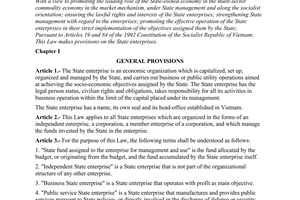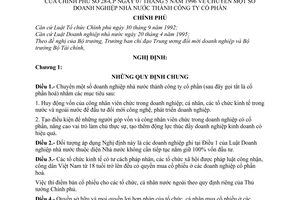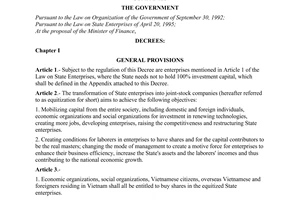Decree No. 28-CP of May 07, 1996, of the Government on the transformation of a number of state enterprises into joint-stock companies đã được thay thế bởi Decree No. 44/1998/ND-CP of June 29, 1998, on the transformation of state enterprises into joint-stock companies và được áp dụng kể từ ngày 14/07/1998.
Nội dung toàn văn Decree No. 28-CP of May 07, 1996, of the Government on the transformation of a number of state enterprises into joint-stock companies
|
THE
GOVERNMENT |
SOCIALIST
REPUBLIC OF VIET NAM |
|
No. 28-CP |
Hanoi, May 07, 1996 |
DECREE
ON THE TRANSFORMATION OF A NUMBER OF STATE ENTERPRISES INTO JOINT-STOCK COMPANIES
THE GOVERNMENT
Pursuant to the Law on Organization of the
Government of September 30, 1992;
Pursuant to the Law on State Enterprises of April 20, 1995;
At the proposals of the Minister-Chairman of the Central Steering Committee for
Renewal of Enterprises, and the Minister of Finance,
DECREES:
Chapter I
GENERAL PROVISIONS
Article 1.- The transformation of a number of State enterprises into joint-stock companies (equitization for short) aims at the following objectives:
1. To mobilize capital from the employees and officials in the enterprises; individuals and economic organizations in the country and abroad in order to invest in renewing technologies and developing the enterprises.
2. To create conditions for the capital contributors and the employees and officials in the enterprises to have shares, raise their role as real masters and give a new impetus to enhance the enterprises’ business efficiency
Article 2.- This Decree shall be applicable to the enterprises defined in Article 1 of the Law on State Enterprises in which the State does not need to own 100% of the investment capital.
Article 3.- All economic organizations with legal person status, social organizations recognized by law and Vietnamese citizens aged 18 or more are entitled to buy shares from the equitized enterprises.
The experimental sale of shares to foreign organizations and individuals shall be done in accordance with specific regulations of the Prime Minister.
Article 4.- The ownership right and all legitimate interests of the individuals and organizations that buy shares from the equitized enterprises shall be protected by the State in accordance with current laws.
Article 5.- Shares shall be sold openly at the equitized enterprises or through the system of appointed Commercial Banks and Financial Companies. The sales of shares shall be used only for investment in the development of State enterprises.
Article 6.- The Ministry of Finance shall exert unified management over the issue of shares at the equitized enterprises.
Chapter II
PRINCIPLES FOR DETERMINING THE VALUE OF ENTERPRISES, CONDITIONS AND FORMS OF EQUITIZATION
Article 7.- A State enterprise to be selected for equitization must meet the following conditions:
1. Having a small and medium size (except for the enterprises to be equitized in the forms defined in Point 1, Article 9 of this Decree);
2. Not belonging to the enterprises in which the State needs to own 100% of the investment capital;
3. Having an effective business plan.
Article 8.- Principles for determining the value of an enterprise:
1. The value of an enterprise at the time of equitization is the actual value of the enterprise acceptable to both the seller and the buyer of the shares.
2. Bases for determining the actual value of the enterprise:
a) Statistics in the books of accounts of the enterprise at the time of equitization which have been verified by a lawful audit agency.
b) The advantage coefficients of the enterprise in terms of its geographical location, product prestige and practical business efficiency reflected through the ratio of profit against the average operative capital over the last three years before the enterprise is equitized.
c) The value of the land-use right calculated according to the Land Law and the documents guiding its implementation.
Article 9.- Equitization shall be conducted in the following forms:
1. Keeping intact the existing value of the enterprise and issuing shares as stipulated to attract more capital for the development of the enterprise.
2. Selling part of the existing value of the enterprise.
3. Detaching from the enterprise a component which meets the conditions for equitization.
Chapter III
PREFERENTIAL TREATMENT TO THE EQUITIZED ENTERPRISE AND ITS EMPLOYEES AND OFFICIALS
Article 10.- The equitized enterprise shall enjoy the following preferential treatment:
1. To be entitled to a 50% reduction of the profit tax in two consecutive years from the time it changes its operations in accordance with the Corporate Law.
If the equitized enterprise satisfies the conditions defined in Article 15 of Decree No.29-CP of May 12, 1995 of the Government on detailed stipulations for the implementation of the Law on Promotion of Domestic Investment, it is entitled only to the tax preferential levels specified in Articles 16, 17, 18, 19, 20, 21 and 22 of that Decree.
2. To be exempt from the registration fee on the transfer of assets under the management and use of the equitized State enterprise to the ownership of the joint-stock company.
3. To be entitled to continue borrowing capital from State Commercial Banks according to the mechanism and at the interest rate applied to State enterprises.
4. To be entitled to continue the export and import of goods according to the State prescriptions.
5. Before equitization, it is allowed to distribute at its discretion the residue in the reward and welfare funds (in cash) to its working employees and officials for share-buying.
To be entitled to maintain and develop the welfare fund in kind, the cultural constructions, clubs, clinics and sanitoria in order to ensure the welfare of the laborers in the joint-stock company. These assets shall belong to the labor collective in the joint-stock company and be placed under the management of the trade union in the company.
6. The actual reasonable and necessary expenditures for transforming the State enterprise into the joint-stock company shall be accounted for in the value of the enterprise as stipulated by the Ministry of Finance.
Article 11.- The laborers in the equitized enterprise shall be entitled to enjoy the following preferential treatment:
1. Financial preferential treatment:
a) To be provided by the State with a number of shares, depending on the seniority and work performance of each person. The laborers shall enjoy the dividends of these shares which can be inherited by their children who also work at the joint-stock company but these shares are not transferable. These shares shall belong to the State ownership in the joint-stock company.
The value of the shares issued to each person shall not exceed six months’ salaries and wages based on grades and positions on wage scale issued by the State; the total shares issued shall not exceed 10 % of the value of the enterprise.
b) To be entitled to buy a number of shares with deferred payment in 5 years at the interest rate of 4% per annum; the total shares bought with deferred payment shall not exceed 15% of the value of the enterprise, or 20% of the value of the enterprise if its self-procured capital represents 40% or more of its value.
2. To be entitled to continue to work at the joint-stock company (if they wish) as provided for in Article 31 of the Labor Code of June 23, 1994. If after 12 months from the time the enterprise becomes a joint-stock company, the laborers lose their jobs due to its technological restructuring to meet the need of reorganizing the business operation, they shall benefit from the policies stipulated in Article 17 of the Labor Code and Decree No.72-CP of October 31, 1995 of the Government.
Chapter IV
ORGANIZATION OF IMPLEMENTATION
Article 12.- Basing themselves on the conditions defined in Article 7 of this Decree, the Ministers, the Heads of the ministerial-level agencies, the Heads of the agencies attached to the Government (Ministers for short), the Presidents of the Peoples Committees of the provinces and the cities directly under the Central Government shall, in consultation with the Party Steering Commission or the provincial/municipal Party Committee, decide the list of State enterprises to be equitized from now till the end of 1997 and send it to the Central Steering Committee for Equitization, the Ministry of Finance, the Ministry of Planning and Investment for monitoring.
The Managing Boards of the State Corporations established under the Prime Minister’s decision shall, after consulting the Party Steering Commission (if any) or the Party Committees in the Corporations, draw up the list of enterprises to be equitized and report it to the Prime Minister for approval and, at the same time, send it to the Ministry of Finance, the Ministry of Planning and Investment for monitoring.
Article 13.- Within 30 days after receiving the full dossier requesting the appraisal of the value of an enterprise, the Ministry of Finance (the system of the General Departments for Management of State Capital and Property in Enterprises) shall examine and decide the value of the enterprise after getting the written agreement of the concerned Ministry in charge of the branch, or the province and city directly under the Central Government.
Upon receiving the decision to transform the State enterprise into a joint-stock company, the enterprise shall organize the issue of shares and ensure that the shareholders receive their shares within 30 days at the latest after the end of the issue time limit.
Article 14.- Competence to carry out the equitization:
1. With regard to the enterprises with State capital (including budgetary allocations, budget-derived capital and the self-procured capital) of more than 3 billion VND, the Ministers, the Presidents of the Peoples Committees of the provinces and cities directly under the Central Government shall elaborate the equitization plan before sending it to the Central Steering Committee for Equitization which shall submit it to the Prime Minister for approval and permission for its implementation according to Article 19 of this Decree.
2. With regard to the enterprises with State capital of 3 billion VND or less, the Ministers, the Presidents of the People’s Committees of the provinces and cities directly under the Central Government shall organize the equitization according to this Decree, provide guidance and supervise the implementation by the concerned Ministries. The documents relating to equitization issued by the Ministries, the provinces and cities directly under the Central Government must be sent to the Central Steering Committee for Equitization and the Ministry of Finance for monitoring.
3. With regard to the equitization of member enterprises of a State Corporation established under the Prime Ministers decision, the Managing Board shall work out the equitization plan and submit it to the Central Steering Committee for Equitization for implementation in accordance with Article 19 of this Decree.
Article 15.- The decision of a competent State agency to transform a State enterprise into a joint-stock company as stipulated in Article 14 of this Decree shall replace the license to establish the joint-stock company stated in Article 16 of the Corporate Law.
Article 16.- Registration of business of a joint-stock company:
1. The equitized State enterprise shall operate in accordance with the Corporate Law and must register its lines of business with the Planning and Investment Service of the province or city directly under the Central Government, where the enterprise has its head office.
2. Within 15 days after receiving the full dossier on business registration, the Planning and Investment Service shall issue the certificate of business registration to the joint-stock company.
3. The dossier on business registration comprises:
a) The decision of the competent level to transform the State enterprise into a joint-stock company;
b) The Statute on the organization and operation of the joint-stock company already adopted by the congress of shareholders;
c) The minutes on the election of the Managing Board and the appointment of the executive Director;
d) The lawful certificate of the right to use the main office of the enterprise.
Article 17.- Management of State capital at a joint-stock company:
1. To transform the whole of an independent enterprise into a joint-stock company:
The General Director of the General Department for Management of State Capital and Property in Enterprises shall appoint a person to directly manage the State capital in the joint-stock company after consulting the concerned Minister in charge of the branch, or the President of the Peoples Committee of the concerned province or city directly under the Central Government.
2. To transform a component of an independent State enterprise (State corporation, independent enterprise with or without Managing Board) into a joint-stock company:
The Managing Board of the State enterprise which has a Managing Board or the Director of the State enterprise which has no Managing Board shall appoint a person to directly manage the State capital at the joint-stock company established through the equitization of a component of its parent enterprise.
3. The person directly managing the State capital in the joint-stock company shall perform his/her powers and duties according to Articles 50 and 54 of the Law on State Enterprises.
4. The profit earned from the State capital in the above-said joint-stock company shall belong to the State and be used only for investment in the development of the State enterprise and shall be remitted to:
a) The State budget in the case defined in Item 1, Article 17 of this Decree.
b) The enterprise which manages the State capital in the joint-stock company in the case defined in Item 2, Article 17 of this Decree.
Article 18.- To establish the Central Steering Committee for Equitization with the Minister-Chairman of the Central Steering Committee for Renewal of Enterprises as its Chairman, a Vice-Minister of Finance as its Standing Vice Chairman, a Vice Minister of Labor, War Invalids and Social Affairs and a Vice-President of the Vietnam General Confederation of Labor as its member. The Equitization Commission of the General Department for Management of State capital and Property at Enterprises shall act as standing organ. The Central Steering Committee for Equitization shall have the power to request the concerned Ministries (when necessary) to designate a number of their specialists as members of this standing organ.
Article 19.- The Central Steering Committee for Equitization shall assign the tasks, organize the implementation and issue the procedure of equitization. It shall, together with the Ministries, the provinces and cities directly under the Central Government and the Managing Boards of the State corporations established under the Prime Minister’s decision, directly organize the implementation at the enterprises with a State capital of more than 3 billion VND and at the member enterprises of the above-mentioned corporations; give guidance for, supervise and monitor the Ministries, the provinces and cities directly under the Central Government in equitizing enterprises assigned to their management; report in time the newly-arising questions to the Prime Minister for settlement in order to carry out well the equitization. By the end of the second quarter of 1998, the Steering Committee shall conduct a review of the program and report it to the Prime Minister.
Chapter V
IMPLEMENTATION PROVISIONS
Article 20.- This Decree takes effect from the date of its signing. The previous provisions on equitization contrary to this Decree are now annulled.
Article 21.- The Minister of Finance, the Minister of Labor, War Invalids and Social Affairs, the other Ministers and the heads of the concerned branches shall provide guidance on the implementation of this Decree.
Article 22.- The Ministers, the Heads of the ministerial-level agencies, the Heads of the agencies attached to the Government, the Presidents of the People’s Committees of the provinces and cities directly under the Central Government, the Managing Boards of the State Corporations established under the Prime Minister’s decision shall have to implement this Decree.



